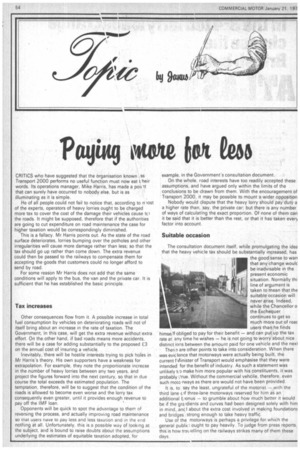Pagittg make fltut tem
Page 56

If you've noticed an error in this article please click here to report it so we can fix it.
CRITICS who have suggested that the Organisation known as Transport 2000 performs no useful function must now eat I heir words. Its operations manager, Mike Harris, has made a poiint that can surely have occurred to nobody else, but is as illuminating as it is simple.
He of all people could not fail to notice that, according to rr lost of the experts, operators of heavy lorries ought to be charged more tax to cover the cost of the damage their vehicles cause to the roads. It might be supposed, therefore that if the authorities are going to cut expenditure on road maintenance the case for higher taxation would be correspondingly diminished.
This is a fallacy. Mr Harris points out. As the state of the road surface deteriorates, lorries bumping over the potholes and other irregularities will cause more damage rather than less; so that the tax should go up rather than come down. The extra revenue could then be passed to the railways to compensate them for accepting the goods that customers could no longer afford to send by road.
For some reason Mr Harris does not add that the same conditions will apply to the bus, the van and the private car. It is sufficient that he has established the basic principle.
Tax increases
Other consequences flow from it. A possible increase in total fuel consumption by vehicles on deteriorating roads will not of itself bring about an increase in the rate of taxation. The Government, in this case, will get the extra revenue without extra effort. On the other hand, if bad roads means more accidents, there will be a case for adding substantially to the proposed E3 on the annual cost of insuring a vehicle.
Inevitably, there will be hostile interests trying to pick holes in Mr Harris's theory, His own supporters have a weakness for extrapolation. For example, they note the proportionate increase in the number of heavy lorries between any two years, and project the figures forward into the next century, so that in due course the total exceeds the estimated population. The temptation, therefore, will be to suggest that the condition of the roads is allowed to become even worse and the lorry tax consequently even greater, until it provides enough revenue to pay off the IMF loan.
Opponents will be quick to spot the advantage to them of reversing the process, and actually improving road maintenance so mat users nave to pay less and less taxation and in the end nothing at all. Unfortunately, this is a possible way of looking at the subject, and is bound to raise doubts about the assumptions underlying the estimates of equitable taxation adopted, for
example, in the Government's consultation document.
On the whole, road interests have too readily accepted these assumptions, and have argued only within the limits of the conclusions to be drawn from them. With the encouragement of Transport 2000, it may be possible to mount a wider opposition Nobody would dispute that the heavy lorry should pay duty a a higher rate than, say, the private car; but there is any number of ways of calculating the exact proportion. Of none of them can it be said that it is better than the rest, or that it has taken every factor into account.
Suitable occasion
The consultation document itself, while promulgating the idea that the heavy vehicle tax should be substantially increased, has the good sense to wan that any change woulc be inadvisable in the present economic situation. Normally thi line of argument is taken to mean that the suitable occasion will never arise. Indeed, while the Chancellor o the. Exchequer continues to get so much more out of roac users than he finds himse,lf obliged to pay for their benefit — and can put up the tax rate at any time he wishes — he is not going to worry about nice distinct ions between the amount paid for one vehicle and the nexi Thene are other points to take into consideration. When there was evidence that motorways were actually being built, the current f viinister of Transport would emphasise that they were intended for the benefit of industry. As such a statement was unlikely to make him more popular with his constituents, it was probably Orue. Without the commercial vehcile, therefore, even such mote TwayS as there are would not have been provided.
It is, to say the least, ungrateful of the motorist with the third lane clf three-lane motorways reserved for him as an additional Ltonus — to grumble about how much better it would be if the gradients and curves had been designed solely with him in mind, anc i about the extra cost involved in making foundations and bridges .strong enough to take heavy traffic.
Use of the motorways is perhaps a privilege for which the general public ought to pay heavily. To judge from press reports, this is how wax/ening on the railways strikes many of them these days.


























































































































